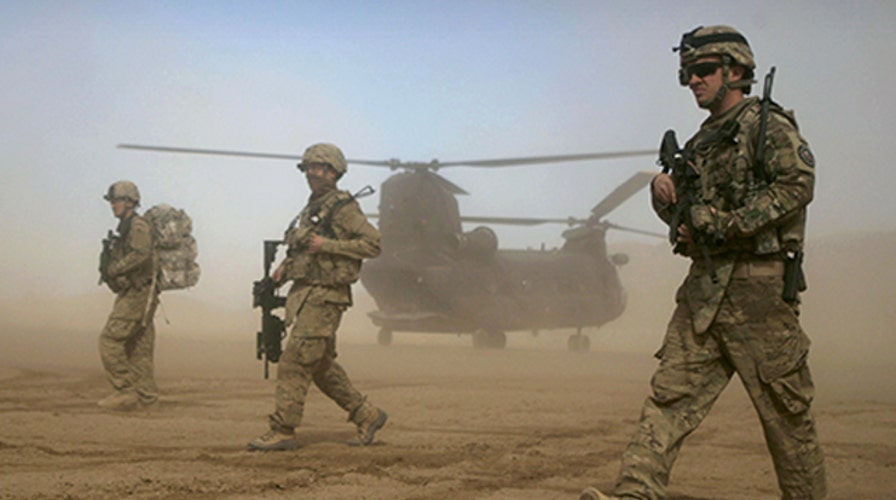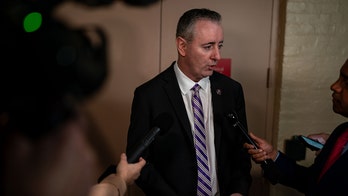When he arrived on his first visit to Washington, 11 years ago this month, Afghan President Hamid Karzai loomed as a captivating, even romantic, figure: a Pashtun exile, who had returned to help liberate his native land from Taliban barbarism, an honored guest of President and Mrs. Bush at the State of the Union address, and an unlikely style icon whose qaraqul hats and flowing capes inspired a brief-lived fashion trend.
Now, as he embarks on the usual round of meetings in the capital this week -- congressional leaders and academics, the secretaries of state and defense, capped by sessions at the White House, on Friday, with President Obama and his aides -- Karzai’s presence in Washington sparks next to no fanfare at all. To some extent, this is the inevitable by-product of familiarity. Yet it also reflects Americans’ weariness with what has become a classic alliance: messy, fractious, scarcely satisfactory to Washington -- and worlds better than the alternative.
“I think both sides would agree that, after ten years, neither of us would be satisfied with where we are today,” said Karl F. Inderfurth, a former assistant secretary of state for South Central Asia and now a senior adviser at the Center for Strategic and International Studies. “Ups and down define this relationship, and the question now is: Can a more steady path be found as we transition out of our combat role into a longer-term commitment to Afghanistan that will indeed go beyond 2014?”
The White House has cautioned that this week’s conversations between the two presidents will not produce a final decision on how many troops the U.S. keeps in Afghanistan after the American combat mission concludes at the end of next year. But senior national security aides to President Obama have refused even to rule out the “zero option” -- the idea that all U.S. troops may depart Afghanistan before the start of 2015. Pentagon commanders have recommended a residual force, for training and counterterrorism missions, of 10,000 to 15,000.
Sources told Fox News the Obama administration may be floating much lower figures as a way of pressuring Karzai to offer concessions on other sticking points in the “bilateral security agreement” the two nations are negotiating, and which Washington hopes to have inked by November. Those sticking points include the degree of immunity from criminal prosecutions that remaining U.S. forces would enjoy, as well as their freedom of movement throughout Afghanistan.
“Karzai's relationship with [George W.] Bush was very congenial. They had a relationship grounded in mutual trust and respect,” Kabul-born analyst with The German Marshall fund in Washington Javid Ahmad said. “But it all changed when Obama came to office, and Karzai got increasingly distanced because of the assessment by some of the insiders in Washington that Karzai was part of the problem, and that he had to be dealt with.”
Asked to assess how Karzai has acquitted himself across his 11 years at the helm of his country’s government, an aide to Secretary of State Hillary Clinton noted that the 55-year-old Karzai has twice been elected president in historic free elections – an assessment that ignored the fact that the more recent elections, held in August 2009, were riddled with irregularities.
“Afghanistan has made considerable progress over the last ten years,” State Department spokeswoman Victoria Nuland said in a press briefing on Tuesday, “particularly if you compare it to the country that it was on September 11th, 2001. It is now a democratic country with an elected government with human rights for all. Obviously, like all transitioning democracies, there are a huge number of challenges. There are security challenges, there are political challenges, there are economic challenges….The United States is deeply invested with our international partners in supporting and helping Afghanistan as it continues to try to move forward on all of those fronts.”
Karzai once vowed to eliminate the lucrative poppy trade in his country -- a wellspring for the world supply of heroin -- by 2006; that never happened. He has, at times, chafed at American intervention in his country, decrying the killing of civilians in drone strikes, the conduct of nighttime raids in Afghan villages, the lack of control over foreign troops that he has consistently sought to exercise. He has weathered persistent charges of cronyism, electoral fraud and laxity in his efforts to eradicate the poppy fields; he has also survived at least four assassination attempts.
More than 2,100 Americans have died since Operation Enduring Freedom was launched to topple the Taliban in the wake of 9/11; and nine donors’ conferences held for Afghanistan since 2003 have produced more than $67 billion in pledges of aid from the international community. And yet living standards in the country remain among the world’s lowest.
Analysts attribute that to tribal differences, endemic corruption and disregard for the rule of law. The plight of girls has improved since the days of the Taliban but they still face episodic mistreatment and cultural backwardness that does not accord them full equality.
“While I liked and respected President Karzai, there was too much corruption,” President Bush wrote in his 2010 memoir, Decision Points.
“No doubt he made mistakes,” the former president said, adding: “But despite all the forces working against him, he never lost his determination to lead his country toward a better day. He helped give the Afghan people hope, something they hadn’t had in many years.”





